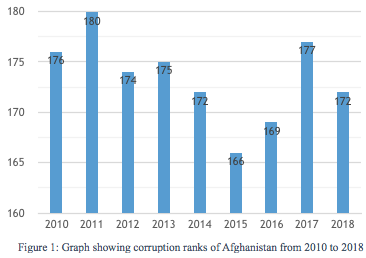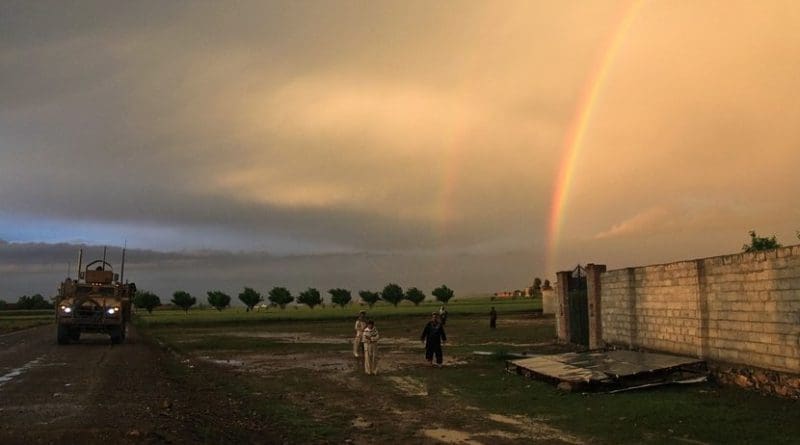Mismanagement Of Funds: A Symptom Of Corruption In Afghanistan – OpEd
By Hamayun Khan
The persistence of political turmoil in Afghanistan has plagued its institutions including that of economic and financial agencies, economic crises and lack of expertise in the financial sector have led to mismanagement of financial aids flown straight into Afghanistan, which eventually gives birth to administrative corruption. Although, over the last one and a half-decade efforts have been made by the government to chase off corruption and the war-torn financial agencies of Afghanistan have been somewhat rebuilt, still there is a dire need for proper Financial Management of the foreign funds flown into the country.
According to the 2018 Corruption Perceptions Index reported by Transparency International shows that Afghanistan is the 172 least corrupt nation out of 175 countries which means that the country holds 3rd position for being the most corrupt country, Corruption Rank in Afghanistan averaged 169.62 from 2005 until 2018, reaching an all-time high of 180 in 2011 and a record low of 117 in 2005, as shown in the graph.

Hundreds of millions of dollars of financial aids have flown to Afghanistan for the rehabilitation of the country’s war-torn institutions, with such a huge amount of dollars provided by the American government increasingly flowing into Afghanistan, the United States have hired two global auditing firms one of them being the Special Inspector General for Afghanistan Reconstruction (SIGAR) to determine whether the Afghan government could be counted on to safeguard the allotted money.
However, SIGAR’s findings of the financial operations by the Afghan government were appalling as the American officials struggled to keep them private. But the flow of the money continued, despite warnings from the auditors that none of the Afghan ministries could be believed to keep the funds from being stolen or wasted. the problems ascertained by the auditors are given in detail in a report published by the Special Inspector General for Afghanistan Reconstruction (SIGAR), the findings have further raised questions about the efficacy and sagacity of giving such a huge amount of aid directly to a government holding a top rank in the list of most corrupt countries.
Fund Management by people with little financial knowledge strengthens corruption in the country. i.e. Often due to the lack of professional staff, the Ministry of Finance (MoF) has failed to control and manage the funds allotted to other government ministries that they do not spend as per the plans which lead to corruption. Corruption, in turn, causes blockade of the foreign aids to Afghanistan, as recently the USA financial aid to Afghanistan allotted for the construction of a hydroelectric project to provide power to the cities of Kandahar and Ghazni in southern and southeastern Afghanistan was stopped. “The project is supposed to be worked on sans American aid”, as Secretary of State Mike Pompeo said in a written statement, he further added, “given the Afghan government’s inability to transparently manage U.S. government resources.”
Since Afghanistan is a veteran of decades of war and its foundations are newly formed, the allocation of external assistance without proper management and control is like transferring a company’s leadership to a fresh graduate who is now on a professional ground, therefore, the international community and the US must consider the flip side of the coin. Nonetheless, since the US-Taliban peace deal has started, the United States’ have increasingly tried to built pressures on the Afghan Government to make efforts to fight corruption “We expect the Afghan government to demonstrate a clear commitment to fight corruption, to serve the Afghan people and to maintain their trust,” Mr. Pompeo said in the statement. “Afghan leaders who fail to meet this standard should be held accountable.” Mr. Pompeo further added.
Moreover, favoritism and nepotism are the other major hindrances deterring the smooth flow of funds and paving ways for corruption, i.e. When a ministry wants to provide clean water to villagers, it is sometimes only possible if private companies belonging to local power brokers usually members of parliament, district administrators or police chiefs are initially given the construction contracts. If they do not win the bid, they try to take their share through extortion. Sometimes, the ministry’s facilitating partners lose their equipment or find them on fire on our road projects because they deny paying a bribe to the armed groups that control the project jurisdiction.
The ministry of rural development is considered to be the most important arm of government. They are involved in the rehabilitation of nearly 35,000 of the roughly 40,000 villages across the country. In the process, they provide around 70% of Afghans with pivotal infrastructure, i.e. midwife clinics, schools, waterworks, bridges, roads, women’s training centers, and solar power projects. This is very much important to work for those who are actually in need, yet it is often intercepted by the corrupt politicians who tend to find any possible alternative to grab the money.
Given the detrimental political disturbance in the country serving as a key driver for administrative corruption, the central government must ensure the provision of proper financial training and development platforms for those who are authorized to control funds, further, there is a significant need for financial education to be mainstreamed to properly handle fund flow and avert the misappropriation of funds.
*Hamayun Khan is from Afghanistan, an MBA final year student at I.K.Gujral Punjab Technical University (India).

